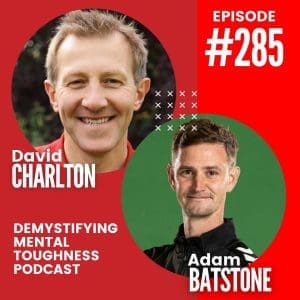12 May 2023

Helping You Gain A Mental Edge
How To Overcome Performance Anxiety And Play To Your Potential
Why is it that people seek the help of a Sports Psychologist?
Below is a list of the top 10 challenges that we come across on a regular basis:
- Loss of skills, for example, an inability to transfer practice and training to competitive events or lost move syndrome in gymnastics.
- Being too nervous before competing
- Lack of enjoyment or thoughts of quitting sport
- Worrying too much about what other people think
- Hiding in the background and not expressing themselves fully
- Catastrophising about their form or their future
- Being too hard on themselves during a match or competitive event
- Dealing with criticism from coaches and teammates
- Poor body language
- Troubles communicating with other people
I could easily add more however I thought I’d keep it relatively simple by stopping at 10 challenges.
When we look at the top 6 challenges there is an argument to say they could fit into one category – performance anxiety.
What is Performance Anxiety?
Performance anxiety, also known as stage fright, is a psychological condition characterised by excessive fear and anxiety performing in front of spectators or other people. It can occur in different situations whether you are an athlete or a coach. Often it is in competitive events, especially ones perceived as more important.
People with performance anxiety often experience physical symptoms such as sweating, tightness in the chest, rapid heartbeat or for some difficulty breathing. What can often happen is that they go on to experience a cluttered mind, tension, have more negative thoughts than normal, often they focus intensely on outcomes (scores or accuracy of shots) and their lack of competency at a skill or task.
How can you overcome Performance Anxiety?
I’d like you to follow this 6 step reflective process taken from Gibbs Model of Reflection if this is you, where I cite a case study of a former client that I successfully supported.
Step 1– Description – Facts. What Happened?
Female Golfer, 22 Years Old, came to me as she was disappointed with how she played the previous season in big national tournaments. She recognised that she got extremely nervous and was unable to perform to anywhere near the level she was capable of.
Step 2 – Description – Thoughts and Feelings. What were your thoughts and feelings?
She was unable to sleep deeply in the 48 hours before the tournaments, catastrophising about how she would do and how she was swinging the golf club. Her thoughts were very negative. She’d then go and practice more and more and be spent emotionally and physically before the tournament started. She was lost and was being very reactive in her approach letting her emotions rule. Towards the end of rounds she almost gave up as she had nothing to give and was on the verge of quitting the game.
Step 3 – Evaluation – How do the facts and thoughts impact on each other?
FACT – She was not performing
FACT – She was very anxious
FACT – She was not sleeping well
FACT – She was in a cycle of reacting to events
THOUGHTS – She was not enjoying golf
THOUGHTS – She was feeling helpless and confused
THOUGHTS – She was beating herself up a lot
THOUGHTS – She compared herself to others in a negative fashion
Step 4 – Analysis – What sense can be made of the situation?
The golfer because she was not performing was convinced it was a purely technical issue initially and worked harder, and harder to fix the issues. As a result, she felt that she was obliged to perform well because of the amount of hard work she had put in. She also recognised that she was practicing out of a place where she lacked trust in herself. She was letting her emotions and anxiety to be technically perfect to drive her practice.
Step 5 – Conclusion – What will be your focus to improve?
We reasoned that the best approach included the following points:
- To practice on her terms.
- To consider different ways to practice other than simply a technical fix approach.
- To recognise when working with her coach was helpful and when it caused her to compete in a “training” mindset.
- To find strict performance routines that would help her relax.
- To use mindfulness exercises creatively so that she could switch off between shots.
Step 6 – Action – If it happened again what would you do or need?
- She would take some time to stop, she’d get away from golf for a minimum of 2 days and review her notes. She’d follow this objective reflective process whilst reaching out to two trusted mentors for guidance.
Summary
Taking time to reflect and follow this process (Gibbs Model of Reflection) can be very healing for people and help them take the emotion out of their situation and form a plan of action. My client certainly found this, with my support.
Other ways to help you consider how you can perform better under pressure include listening to this week’s Demystifying Mental Toughness Podcast episode where with Professor Adam Nicholls, we discuss the topic and then share some very simple and effective strategies to help you.it
Relevant podcast episodes to overcome performance anxiety
Ep166: Mark Bennett MBE – How To Help Athletes and Coaches Reflect On Their Performances
Ep112: David Charlton – How to Deal with Physical Insecurities as a Young Athlete
Ep094: Professor Adam Nicholls – How to Develop Mentally Strong Rugby Players
Ep089: Will Shaw – How To Transfer Your Golfing Skills To The Course
Ep050: Compilation – Mental Strength Does Not Guarantee Success
Relevant blogs for those who suffer with nerves before competing
Blog: How To Play Well When You Aren’t Feeling Great
Blog: 5 Coaching Tips to Develop Mentally Tough Footballers
Blog: Mental Preparation for Combat Sports
Blog: Does Your Warm Up Influence How You Perform?
Blog: 5 Tips to Help You Perform Fearlessly When You Compete
Valuable resources to help you improve your perspective
Understanding yourself better – The 4Ts. Timing, Thoughts, Tension and Temperature
Understand your mental toughness tendencies
Great conversations to have with your kids to help them embrace nerves better
Conversations with Kids – Fixed Mindset
Conversations with Kids – Emotional Rollercoaster
Conversations with Kids – Bravery
Social Media
Our posts on Instagram this week have received a lot of traction in relation to performing under pressure where we’ve shared many tips, quotes and journal prompts.
QUOTE OF THE WEEK

3 WAYS TO LEARN MORE ABOUT OUR WORK:

Best Wishes
David Charlton
Online Sports Psychologist | Mental Performance Coach who supports many highly motivated athletes, young and old, developing their skills or who are already highly skilled so that they gain a mental edge and get the most from their talent across the globe from USA/Canada to Great Britain and Ireland to UAE, South Africa, Australia and New Zealand, using ONLINE Video Conferencing.
Managing Director – Inspiring Sporting Excellence
Host of Demystifying Mental Toughness Podcast
Founder of The Sports Psychology Hub
Author of The Mental Edge
With over a decades’ experience supporting athletes, coaches, parents and teams to transfer their skills from training to competitive situations, under pressure.
T: +44 7734 697769







